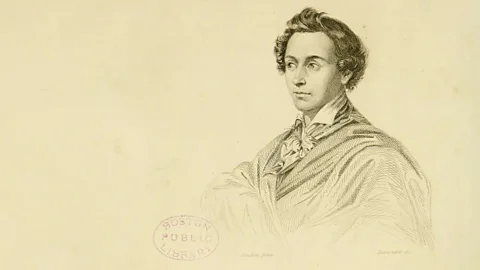 Alamy
AlamyA brand new Apple TV+ collection explores the lifetime of the so-called “King of Cooks and the Chef of Kings” – proven as a wild enfant horrible in post-Revolutionary France who blazed a path for future generations of cooks.
It is described as “the story of the primary movie star chef”. The French language collection Carême is a dramatisation of the lifetime of Antonin Carême, who was born into poverty in pre-Revolutionary Paris round 1784. His expertise would make him chef for the French diplomat Charles Talleyrand, the Emperor Napoleon, the longer term George IV of Britain, Tsar Alexander of Russia and the Baron de Rothschild. He additionally wrote celebrated cookbooks and launched the Toque (the tall chef’s hat), nonetheless in use right this moment – giving start to the very thought of the “movie star” chef.
Certainly, Benjamin Voisin, the actor enjoying Antonin Carême, believes that if the chef had been working within the 2020s, “he’d have been the one with 100 million views on TikTok. That will be the equal of what he did on the time,” he tells the BBC.
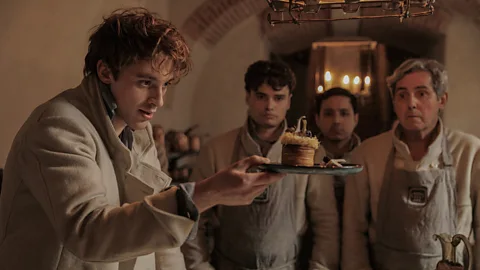 Apple TV+
Apple TV+And Voisin’s portrayal of Carême feels fashionable; he performs him with a contact of the rock star in addition to kitchen chef. He wears an earring, his garments appear to owe extra to the 1980s New Romantic movement than Nineteenth-Century costume, and from his affairs with ladies to his lack of deference to his so-called superiors, he’s what may very well be described (in French) as an enfant horrible. He’s additionally assured, brash and authoritative in his kitchen – a way that echoes Twenty first-Century movie star cooks corresponding to Gordon Ramsay.
The collection is impressed by a biography of Carême and his gastronomy by Ian Kelly, who additionally co-created the collection with screenwriter Davide Serino. The historic determine of the younger chef is definitely described by Kelly in his guide as a “bookish harmless” when he takes his first job, however Voisin’s look within the collection is not too removed from Kelly’s description of Carême aged 25: “He was good-looking, his hair lower and tousled ahead within the fashionably Byronic method… he was described as slight, and a slight eater.” Kelly additionally describes Carême as “formidable, solipsistic, even narcissistic” as an individual – though the Carême on display screen dangers a lot for these he loves.
Certainly, maybe inevitably, the collection takes numerous liberties with the reality, additionally depicting Carême as a spy for his highly effective masters, one thing there is no historic proof for. The present’s lead director Martin Bourboulon describes the added drama as “the appeal of fiction within the present”. The fact is that the actual man did not go away a lot data behind. As Kelly says in his biography, “He [Carême] would disclose the trivia of his skilled life… and the menus, company and elements that made up his working days. However about his private life he revealed nothing.”
What’s true to the period is the depiction of the aristocratic kitchens he labored in, his small military of workers, and their fevered preparations for royal banquets. He is seen within the collection organising a meal for Napoleon Bonaparte, and in actual life he was chargeable for the Emperor’s wedding cake. Carême’s skill to sugar-sculpt led to extraordinary creations within the form of classical lyres and Venetian gondolas, all rigorously sketched out on paper first by the chef himself. However that wasn’t all he was able to, in accordance with Paul Freedman, Professor of Historical past at Yale College.
“He helped set up a routine for a way kitchens have been run,” Freedman tells the BBC. “He additionally outlined dishes and the repertoire of sauces, what was thought of to go along with what meals, what sort of garnishes could be commonplace, and the sort of multi-course eating that will come to be attribute [of haute cuisine]. And as his unique metier was confectionery and sugar sculpting, even having a centrepiece of sculpted meals is owed to Carême.”
Whereas a few of the real-life recipes in his cookbooks nonetheless sound mouthwatering (Kelly mentions an orange flower and pink champagne jelly), others, corresponding to a stuffed boar’s head, may appear unusual to right this moment. However Bourboulon says that, above all, he needed to make the chef himself accessible to a contemporary viewers.
Bourboulon, chargeable for two profitable movie variations of Alexandre Dumas’s historic novel The Three Musketeers, tells the BBC that he needed to keep away from “the same old interval drama type” on this story.
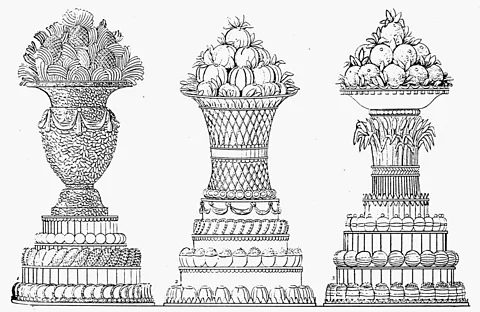 Alamy
Alamy“I actually needed to carry a little bit of sexiness, rock ‘n’ roll perspective, and a contemporary twist for all the principle characters, particularly Carême,” he says. “And Benjamin Voisin is like this in actual life.”
Voisin says their thought of the chef was that he had “a Mick Jagger side to him. It is actually what attracted me”.
“I really like seeking to the historic story of Carême, however this rock star ingredient, that sort of Lenny Kravitz look he has, plus the concept the present provides about his perspective to life, is basically necessary. Possibly that is why Martin got here to me to speak about enjoying him. I additionally love the story of this younger man looking for his place in society.”
The historic Carême’s stellar profession may properly have given him a swagger; he was referred to as “the King of Cooks and the Chef of Kings”. He is usually credited as a founder of French gastronomy and of Grande Cuisine (basic French delicacies which was at its most lavish throughout the Nineteenth Century).
Nevertheless, in accordance with Paul Freedman, Professor of Historical past at Yale College, he may not even be France’s first movie star chef. The Frenchman Guillaume Tirel, referred to as “Taillevent”, is legendary for cooking for French kings throughout his lifetime (1310-95), and wrote a cookbook that also survives, The Viandier. A number of restaurants nonetheless bear his title.
Carême’s standing is, he says, “a star chef of recent Europe, however nonetheless virtually the final of a sort. He lived nonetheless within the time of the courts and cooks discovering aristocratic patrons. He would not have a restaurant or work together with odd folks, [and] his super variety of cookbooks aren’t directed in the direction of amateurs, however in the direction of different cooks.
“So he is a transitional level to the purely fashionable movie star chef, who’re celebrities within the sense of media publicity, their tv presence or simply their skill to be a personality and to run a restaurant.”
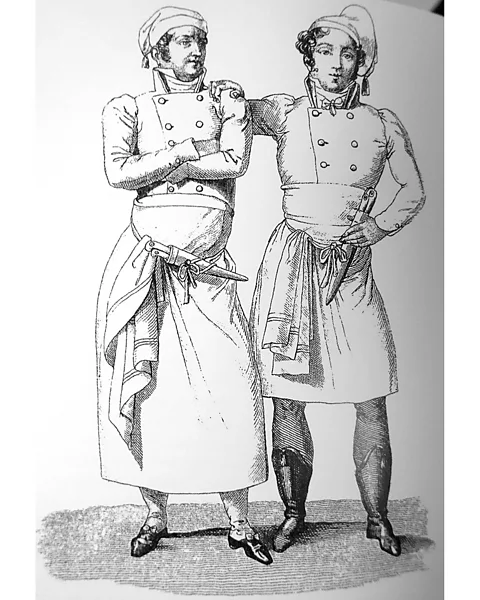 Alamy
AlamyThe younger Carême’s turnaround in life was exceptional. Historian Ian Kelly describes him in his biography, Carême: The First Celebrity Chef (which impressed the collection) as one in every of a number of youngsters in a household from one in every of Paris’s worst slums. By 1792, across the similar time that the “Reign of Terror” would start within the French Revolution (a interval of state-sanctioned violence and executions) he had been deserted by his mother and father however was taken in by a prepare dinner, after which apprenticed to a notable pâtissier, Sylvain Bailly. Whereas nonetheless a really younger man, he was employed by one of the vital well-known politicians of the Napoleonic period: Prince Charles Maurice Talleyrand-Périgord, referred to as Talleyrand.
Even when the actual Carême did not dabble in espionage, Bourboulon factors out that the chef’s culinary brilliance would have been exploited as a show of energy by his employers, and that meals would have been as a lot part of diplomacy throughout the early Nineteenth Century because the modern state banquet is now.
“We all know that Carême labored for Prince of Talleyrand and for Napoleon,” he tells the BBC. “It is so French to share the menu, the meals, and use the standard of the meals to assist diplomatic relationships, and traditionally, they actually did do that. There’s an instance on the finish of the primary episode, when Carême brings in a dessert for Napoleon and an English diplomat seated on the similar desk. And it is precisely how we think about it will have been achieved throughout that point.”
Meals and sensuality
Politics is not the one show of ardour within the narrative both, or as Bourboulon says, “Love is as necessary within the lives of French folks, presumably extra so”. The visuals instantly hyperlink the meals Carême cooks with sensuality; the digicam lingers over the dishes, whereas purple fruit drips over the title sequence. The collection even begins with Carême licking cream off his love curiosity Henriette, performed by Lyna Khoudri.
“The parallel between the 2 kinds of pleasure is there within the collection,” Voisin says. “Arms are concerned in each cooking and the pleasures of the flesh, that is the connection.”
The hyperlink between French meals and sensuality are linked was actually there in Carême’s Paris. Ian Kelly describes how the post-Revolution capital “had change into the Metropolis of Mild – and the capital of meals”. The discuss across the younger Carême, he says, would have been “of philosophy, vogue, meals and intercourse: what the world has come to count on from Paris”.
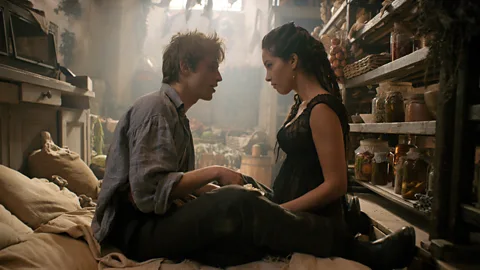 Apple TV+
Apple TV+“I believe it goes again to the picture that France continues to have right this moment as pleasure-loving, as refined, not merely gorging themselves or getting drunk, however [possessed of] a sort of sensuality that’s cultivated within the sense it is tasteful and distinguished,” he tells the BBC.
A French chef, he explains, would change into vital as a standing image for a lot of aristocrats of the Nineteenth and twentieth Century. “One of many largest examples in literature is PG Wodehouse writing about one in every of Bertie Wooster’s aunts, Dahlia, dwelling in terror that her temperamental French chef, Anatole, would stop.”
The period of the movie star restaurant chef was ushered in by Carême’s rising fame, and the cookbooks he wrote, in accordance with Professor Nathalie Cooke, the creator of Tastes and Traditions: A Journey Through Menu History. Earlier than the French Revolution, eating places existed in restricted type in Paris, however most served solely soup. Their proliferation, Cooke tells the BBC, was born from “financial catastrophe”.
“Think about you are an aspiring younger chef and also you’re working in Paris within the late 18th Century, and so they’ve beheaded Marie Antoinette, and so they’re eliminating all these jobs that you have aspired to, cooking for royalty and the aristocracy,” she says. “That is why the restaurant tradition grew: these very expert cooks wanted to earn a living and discover an viewers throughout financial turbulence, and in a post-royalty age. That is additionally why Carême wrote cookbooks: he was establishing himself on this new age of print media, but additionally, by addressing his work to different cooks, he was coaching a brand new breed of chef that was going to serve a bigger viewers as a substitute of simply royalty.”
A later French movie star chef who dominated European meals tradition, Auguste Escoffier, (1846-1935) – who ran eating places on the Ritz motels in Europe, and on the Savoy Lodge and Carlton Membership in London – “is basically Carême’s inheritor,” Cooke says.
“Escoffier actually turns into well-known when he decides to write down down formal French cooking strategies,” she explains. “He was capable of obtain Carême’s imaginative and prescient [of making recipes accessible to other chefs] in a means that Carême couldn’t, as a result of Carême was dwelling within the age of the start of restaurant tradition, which was solely simply growing and solely in Paris. Escoffier took it to London too.” (Carême did spend time in England, serving the then Prince Regent, later George IV, however though he cooked for Tsar Alexander of Russia in Paris, he refused to maneuver there and take a job.)
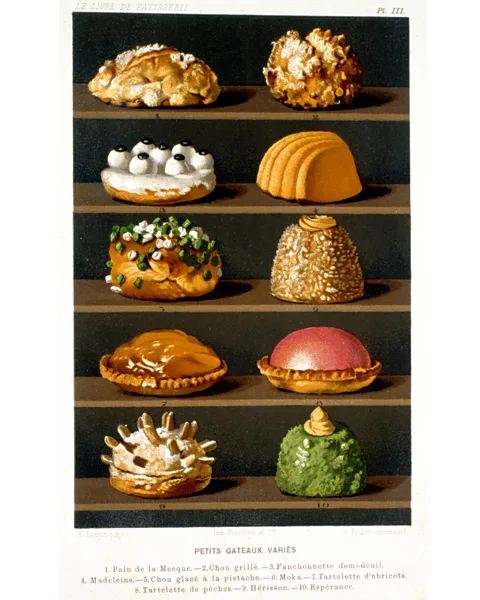 Alamy
AlamyThe emergence of TV and radio (and later web) within the twentieth Century has meant that the movie star chef has change into a world phenomenon, not simply confined to these writing cookbooks or operating eating places, however open to all these with a knack for connecting with their viewers. Essentially the most well-known chef of the tv period, Julia Child, (portrayed by Meryl Streep within the 2009 movie Julie and Julia) was an American who had lived in Paris, and a devotee of French cooking. She even received the Antonin Carême Medal for excellence, though this can be a US, not a French, honour.
In one other nod to modernity, the younger Carême within the collection can also be proven collaborating in a chef’s competitors, normalised now by the expansion of exhibits corresponding to Iron Chef, MasterChef, and The Great British Bake Off (which streams internationally as The Nice British Baking Present.) Whereas the latter’s “Showstopper” class may hint its ancestry again to Carême’s personal sugar sculptures of the Nineteenth Century, the primary fashionable skilled occasion of this sort for cooks began in 1983, when one other chef, Paul Bocuse, established the Bocuse D’Or, in Lyon, France.
However now that TV exhibits, podcasting and social media additionally enable expert amateurs to change into celebrities, Paul Freedman says there are traits of how he discerns a really “movie star” chef
“My definition in books and articles that I’ve written is that the up to date movie star chef is distinguished by being thought to be a genius or an artist, [as opposed to] people who find themselves [just] glorious at their craft. The Frenchman Paul Bocuse could be the primary movie star chef in accordance with that definition, within the Nineteen Eighties. Even earlier than he invents dishes, he created the ethos of the chef as genius, and a model of a artistic artist. So the movie star cooks of our period are glorious at their craft, however Ferran Adrià, who was at El Bulli, or René Redzepi of Noma, or Heston Blumenthal in Britain are all [also] artistic geniuses, or no less than that is how they’re introduced.”
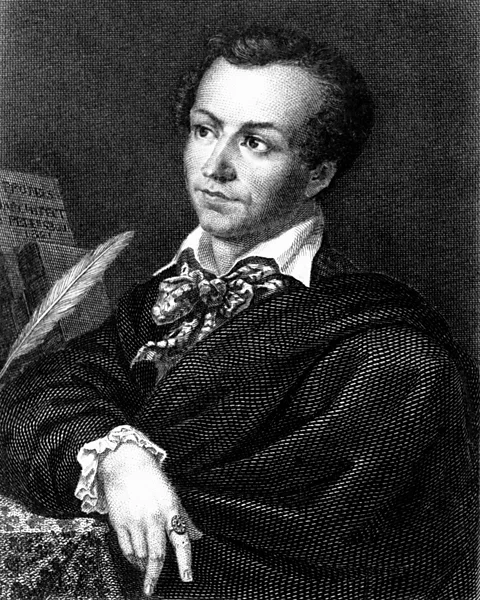 Getty Photos
Getty PhotosThere may be although, a direct line traceable from their creations, and their kitchens, to these of Antonin Carême – and never simply because a few of them may still wear a Toque. Bourboulon hopes that this new portrayal of the chef, almost 200 years after he died, will give his legacy new consideration.
“Though Carême’s title is kind of well-known in France, it may very well be much more well-known, I believe,” he says. “I’d love folks to rediscover, or simply uncover, what he did, how this younger man introduced all his skills to the tables of those highly effective males like Napoleon. His life is a very thrilling factor to combine collectively – meals, love and politics.”
Carême premieres globally on Apple TV+ from April 30, 2025.





